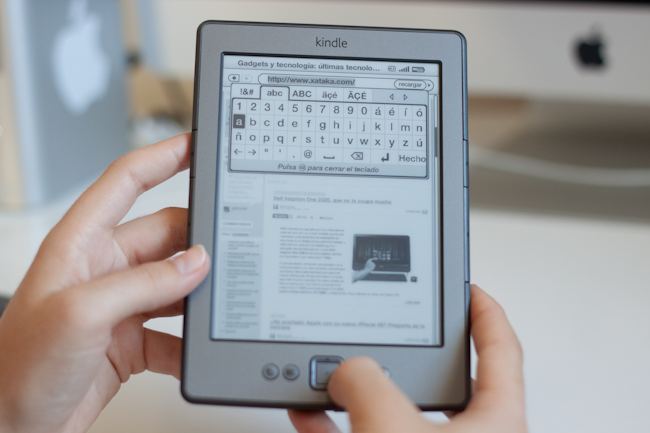The Book Wars: Is There A “Right” Position?
![]() Last night the conflict between Amazon and one of the large publishing companies, Hachette, reached both the national and local news. Their dispute centers on the pricing of ebooks.
Last night the conflict between Amazon and one of the large publishing companies, Hachette, reached both the national and local news. Their dispute centers on the pricing of ebooks.
Amazon claims to have the best interests of readers at heart. In addition, they make a case for the idea that lower prices will actually result in greater revenue for everyone:
For every copy an e-book would sell at $14.99, it would sell 1.74 copies if priced at $9.99. So, for example, if customers would buy 100,000 copies of a particular e-book at $14.99, then customers would buy 174,000 copies of that same e-book at $9.99. Total revenue at $14.99 would be $1,499,000. Total revenue at $9.99 is $1,738,000. The important thing to note here is that the lower price is good for all parties involved (from Amazon Letter to Kindle Direct Publishing authors)
Traditionally published authors, however, believe Amazon has used strong-arm tactics, which bodes ill, or evil, depending how you look at it, because of Amazon’s growing position of power in the book industry. For instance, Amazon delayed delivery of some books—readers waited up to three weeks—then took down the pre-order button of other titles. Finally they stopped selling some books by some Hachette authors.
Things started warming up because those authors have experienced a sizable loss in income. Best-selling author Douglas Preston took it upon himself to write an open letter about Amazon’s negotiation tactics, and more than a hundred other writers signed it with him:
“Without taking sides on the contractual dispute between Hachette and Amazon, we encourage Amazon in the strongest possible terms to stop harming the livelihood of the authors on whom it has built its business. None of us, neither readers nor authors, benefit when books are taken hostage.
We feel strongly that no bookseller should block the sale of books or otherwise prevent or discourage customers from ordering or receiving the books they want. It is not right for Amazon to single out a group of authors, who are not involved in the dispute, for selective retaliation. Moreover, by inconveniencing and misleading its own customers with unfair pricing and delayed delivery, Amazon is contradicting its own written promise to be ‘Earth’s most customer-centric company’.” (As quoted in “Amazon-Hachette fight deepens as authors take sides,” The Guardian).
What’s more, 900+ authors took out an ad in the New York Times that was to run on Sunday again calling for Amazon to stop their hardball tactics.
Amazon countered by sending their letter to their KDP authors, specifically asking them to write Hachetter (or “spam” them, as one online site characterized it).
Now the analysis is underway. The Los Angeles Times, for instance, published an article examining Amazon’s “everyone makes money if the ebook prices are lower” claim. Here’s a sampling:
The assumption underlying Amazon’s statement is that 1.74 more books will be sold for any and all books. In the real world, it would be delightful if this could work, but it implies that if only publishers dropped the price of e-books by $5, millions more books would be sold. In fact, the book-buying pool probably isn’t that expandable. At some point, readers are going to reach the end of their book budgets. (“What Amazon’s e-book numbers are and aren’t telling you,” The LA Times)
That’s only one of several criticisms about Amazon’s approach to pricing.
In all this, the issues seem a little murky. I, as an author who is benefiting from Amazon’s publishing and as a reader who enjoys inexpensive ebooks (or free ones during promotions), think Amazon is right about keeping the price of ebooks as low as possible and giving authors as high a percentage of the pie as possible.
Of course Amazon has no say about what percent of the pie Hachette will give their authors.
And they shouldn’t. But should they have any say about the price the publisher sets for his product? In their dealings with Hachette, Amazon is essentially acting as a bookstore. Do bookstores tell the publishers to drop the price of their product by a third?
I imagine they can determine that their clientele won’t buy at a higher price, so they could decline to carry the product. That should be their right. But literary agent Brian DeFiore articulated what traditionally published authors see and fear:
Authors who work with traditional publishers like Hachette tend to make more, per copy, from hardcover sales than from e-books. If cheaper e-books draw people away from hardcovers, that could hurt these authors financially. Plus, DeFiore said, Amazon has a huge share of the e-book business, through its Kindle e-reader—even more than it does with physical books. If lower e-book prices were to eventually destroy the market for physical books entirely—or even shrink it enough so that it wouldn’t make financial sense for traditional booksellers to publish them—that would help Amazon consolidate its power, which would ultimately be dangerous for authors. “What happens if, and when, there’s one retailer for e-books left, and they just decide, ‘You know what? We want to price books at four-ninety-nine.’ (“Amazon’s Failed Pitch to Authors,” The New Yorker)
These fears do not seem unfounded:
Journalist Brad Stone writes that [Amazon CEO Jeff] Bezos once suggested that the company should approach small publishers—among the most vulnerable of the company’s suppliers—“the way a cheetah would pursue a sickly gazelle.” Amazon is able to pursue this strategy because it is responsible for the sale of forty per cent of all new books and sixty-four per cent of e-books in the United States, according to the Codex Group, a research firm. The more powerful Amazon becomes, the greater becomes its ability to make demands of its suppliers—in this case, publishers and authors. (Ibid., emphasis added)
In such a scenario, I think readers should be concerned, too. Instead of dropping the price to $4.99, what’s to keep a company dominating the market from raising the price to $19.99? That’s the way monopolies of old ran their businesses. First they lowered prices so far that they forced smaller companies to sell out. They, when they were the only game in town, they raised prices and started bleeding customers.
Amazon could change the rules for authors like me, as well. I’ve already experienced that on a small scale as they have automatically included me in their new lending program—and I have no say and no idea if it will increase my revenue or reduce it.
Companies like Walmart are accused of this same type of, “drop the price lower than the competition can match,” tactic. In fact, so were the big box bookstores—Crown and Borders and Barnes & Noble—which pushed out any number of independent bookstores. While there wasn’t any price gouging (that I’m aware of), holding the corner on books in a town or community, was a powerful role.
The questions, as I see them, are these:
- What’s best for authors (without whom there would be no books) on the short term, so our society doesn’t lose writing as a profession?
- What’s best for independent writers who had no opportunity to publish prior to digital publishing? (Amazon makes an interesting comparison between ebooks and mass market paperbacks in the last century).
- What’s best for readers (who right now are limited from buying some titles they wish, at least for their Amazon reading device, but who may benefit in the long run from cheaper ebooks)?
- What’s good for the book business in the long run? What will keep book content as free as possible from gatekeepters and dominant publishers/booksellers that can squeeze out whatever they desire for whatever reason they determine?
So, is Amazon the godfather of the book business or a visionary entrepreneur? I’m interested in your thoughts.












































As much as I want to be published, and as much as I’m considering self-publishing, it’s unarguable that a book from a big-name publisher will almost always be higher quality than a self-published book. Part of that $15.99 goes to the editors, designers, and marketers who made it possible. So a publisher should be able to set the price for a physical book and e-book that compensates everyone. And, in keeping with basic principles of capitalism, the publisher should be able to price that book competitively at a price that at least some people will buy. Just because the book is digital and didn’t cost anything extra to produce doesn’t mean hard work didn’t go into it.
It’s unarguable? Sorry to call you out. But what if I argue that a self-published author can do all the things a traditional publishing house can do? Here’s my argument (so I just disproved your point that this is unarguable) – I can hire an editor, I can hire a cover artist, I can use the same print technology. Or I can do all these things myself and if I’m very good, I will have a title that is of higher quality than a big-name publisher. Nothing is preventing an indie book from being a quality product. Big-name publishing doesn’t guarantee quality and indie-publishing doesn’t automatically mean schlock. Don’t disparage your abilities, Alex. If you want to self-publish, research it, create a quality product, and go for it. But if you’ve already convinced yourself that it’s unarguable that you could never do it, well, then, you’re right.
I agree completely that an independent can put out quality as high as and higher than a publishing house–it’s just not the norm, or what readers expect. (Okay, “unarguable” was strong, but I did say “almost” always.) I’m pretty picky about self-published books because of some bad experiences, and I feel like there’s still some stigma. Certain company names on the spines tell me a book will be high-quality, with the occasional exception. They set the standard, and it’s a standard I’m working toward in my writing. Their business model needs some upgrading, and that’s where Amazon is sneaking in.
I agree, Alex, that the traditional publishers are slow off the dime to adjust to the realities of the digital age. But that’s so typical—publishers have been slooooww at just about everything for a very long time.
So, yes, I agree that they do need to re-think their business model. They may even need to rethink their publishing model. I give Thomas Nelson (Harper Collins Christian now) props for setting up their self-publishing arm, WestBow, some years ago. I didn’t like it much when they first announced it, but now I understand that they are doing exactly what Amazon is doing. That’s the kind of thing publishers should do—get in on the influx of new writers, think outside their traditional publishing box, incorporate the changes in the way we read books as an integral part of publishing.
Becky
Westbow, like many other publishers setting up “self-publishing” arms, are nothing more than vanity publishers, not self-publishing. Most of them run by Author Solutions, currently owned by Penguin.
Why publishers want to partner with scams is beyond me. And publishing a book through Westbow is hardly the equivalent of going through Amazon. Not even close.
Hey, I got a little snarky there, Alex, and apologize. I agree that traditional publishing has the infrastructure in place that *should* be able to produce higher quality products, in general, than the average person who is just starting out. My point, though, is that the playing field is rapidly leveling and indie writers have more and more resources available in which to create books that compete directly in quality with traditional publishing. Even paperback distribution into bookstores, which is basically the last thing Big Pub can offer in a significant manner, is becoming more and more available to us indies.
<Shameless self-plug> BTW, I’m an experienced copyeditor who would not object if some indie author would want to pay me to mark up their manuscript in red ink. I’m good at red ink. </shameless self-plug>
In HTML6, <self-plug> will be a recognized tag in Chrome and Firefox that will transform all the text appearing inside the tag into weird blinking bubble letters and translate it into 90’s chatbox speak. When the element is active, the first song in the operating system’s default music player’s playlist will play.
The WordPress comment plug in will go a step further by downloading all the selfies from the commenter’s social media accounts and displaying them below the comment in a slider, prioritized by a semantic awkwardness algorithm.
Self-publish your novel, they said.
You’ll avoid the soulless corporate publishing skullduggery, they said …
Nah. You just get to choose the skullduggery in which you participate. 😉
Is there a “Linux” option for e-books? What if authors started selling their books as downloadable .pdf files? It works on Deviant Art (except the dude I’m thinking of doesn’t actually sell his graphic-novel-in-progress, so paywalls and blahblahtechnobabble). But I would probably have to chuck my Kindle for a tablet that would actually read .pdf files (I have no idea if Kindles can process .pdf.)
Also, can we apply this to buying digital copies of movies and TV shows? Because I would be a lot more inclined to buy stuff if I could get digital copies that I don’t have to pack up and schlep. And I’m pretty sure that would solve at least 75% of the problem of pirating.
I don’t have a set position about ebooks vs print, but e-vids are amazing! I love Amazon and iTunes “season passes”–for $15-30, depending on resolution and season length, one can buy a full season of a TV show and watch the episodes on the computer/tablet/etc –generally the day after it airs on tv. And yes, it totally cuts down on my pirating.
You can always create PDFs or mobis or epub versions of your indie published book for free and sell them through your own website. No one is preventing anyone from doing that. Use Linux, use Word, use whatever OS or program you want. One does not need Amazon or Hachette to produce, manufacture, or sell one’s books. Plenty of people are doing just that in the indie music scene and ebook scene as well.
It’s just that, for now at least, Amazon offers the greatest exposure for the best distribution fee (30% markup on an ebook $2.99 to $9.99), so many indie writers use them. We can use something else if and when Amazon is disrupted by a newer and more effective technology or distribution method.
Kindles do process PDF’s, though I think the font is too small and isn’t changeable. Still, I have a couple PDF’s on my Kindle and have read them/are reading them.
Becky
I’m surprised nobody has mentioned Smashwords — an alternative ebook store that sells DRM-free ebooks that you can just download. I feel like Smashwords has declined in popularity; I think I remember a few of the indie Christian spec-fic novels being on it, but now I can’t find them there. Still, the recent Writing Excuses anthology is for sale there.
Yeah, I think DRM is more about keeping customers by locking them into one company’s store than about preventing piracy. Amazon wants your Amazon account to be your one and only content library, for everything you read or view across all your devices.
Gaming is better than books at having both good DRM and non-DRM options. There’s Steam for a DRM library management system that can be useful despite being kind of creepy because it keeps track of all your gaming activity. Then there’s GOG and probably other stores that offer DRM-free downloads. As an alternative purchasing option for both DRM and DRM-free games, there’s Humble Bundle, which also has a new books section. Humble Bundle might not have what you want, but when it does, it’s great.
Humble Bundle also has a book section that you should check out if you’re into comics.
DRM is meant to prevent piracy. Something it doesn’t do very well, since it so easy to crack for a pirate. Rather, it causes more problems for legitimate customers than it does for pirates.
But Amazon does not force DRM on consumers, the publisher does, which does make it harder to convert to other formats for other readers, yes. But if any publisher wanted to stop using it, like Tor did, they could.
What Amazon, as well as B&N and Apple, do to try and prevent reading on other reading platforms is proprietary ebook formats. Like Amazon uses a modified mobi format. Of course someone who knows how can convert Amazon’s format to other formats using something like Calibre, but not too many readers want to mess with that. They just want to buy and read, and Amazon delivered it to them.
This is a thing I have not heard of. Will check out.
I love (that’s called sarcasm) this piece of disingenuous-ness:
“Without taking sides on the contractual dispute between Hachette and Amazon, we encourage Amazon in the strongest possible terms to stop harming the livelihood of the authors on whom it has built its business….”
How blatant and patently offensive. Preston just took sides.
And this piece of garbage from him:
“We feel strongly that no bookseller should block the sale of books or otherwise prevent or discourage customers from ordering or receiving the books they want.”
Um, like when Barnes & Noble blocked the sale of Simon & Schuster books a few years back? Where was your outrage then? It’s called hardball negotiations. Happens all the time.
But in fact, Amazon isn’t blocking sales! Hachette’s distribution agreement (a contract both parties entered into) expired this past April. Amazon has no obligation to continue distributing Hachette’s books at all and yet continues to do so without a contract. (These books are money makers, after all.) What Amazon did was remove pre-order buttons, which seems a reasonable move given there is no distribution agreement in place. They have not blocked or prevented sales.
To answer your questions:
Amazon and Hachette have NOTHING to do with whether our society will lose the profession of writing. Both could disappear tomorrow and writers will write.
What’s best for Indie writers is to keep writing. Amazon and Hachette could disappear tomorrow and writers will continue to write.
What’s best for readers is having a choice of where, when, what, how much, and in what format they want to buy/borrow/read a book. Amazon and Hachette could disappear tomorrow and readers will still read.
What’s good for the book business is to innovate ways to get more books from writers to readers. Companies in the industry will either adapt to technology or they won’t and they’ll close shop. Music is still around even though 78s are gone. I’m not mourning the loss of 8-track tapes. The music business hasn’t gone away because Tower Records folded. Amazon and Hachette could disappear tomorrow and the book business will be fine.
The problem, Lyn, is distribution. It’s what a lot of indie authors bemoan: How can I get people to find my book? Amazon has done a lot to help, but what if they were the only game in town? Or are you saying, writers will find another way?
I’d like to hear ideas about that.
Becky
Right. If Amazon decided to stick it to the indies, innovation and opportunity is such that other companies will step up and fill the void and/or indie publishers will create new outlets. (Like I said earlier, nothing is preventing me from selling directly from my website. Sure, buyer awareness is an issue, but that’s true for any outlet we use.)
Amazon isn’t and never will be the only game in town. Now, they happen to do a lot of things people like – offer low prices to consumers and they only take a 30% mark-up distribution fee from writers on ebooks priced from $2.99 to $9.99. That has attracted a huge customer and user base.
But Bezos isn’t a dummy, he knows it can all disappear tomorrow and is scared to death that a disruptive technology or business model will unseat him as #1 retailer. (This from an interview with him that I saw on 60 Minutes.) So I imagine he wants to keep indie writers happy – we make him tons of money. 🙂
More to say, so I’ll check back tomorrow.
Amazon isn’t debating the list price, to my knowledge, which publishers have always had control over, but the selling price, which bookstores and retail in general have always had control over. What is more likely is that Hachette wants agency pricing, and Amazon wants to restrict the agency pricing like they currently do for indies, between $2.99 – $9.99, or it defaults to wholesale. But agency pricing only came on the scene in 2010 when Apple colluded with the major publishers and forced Amazon to accept their terms, resulting in high ebook prices and the resulting lawsuit by the DOJ. I’m sure Hatchette is pushing to get full agency pricing back as they did before the DOJ shut it down. Traditionally, publishers didn’t set the selling price, they set the Suggested Retail Price upon which the wholesale price to the bookstore was based. Hatchette has the right to raise that price today. Amazon either buys at that price or refuses.
One, it would be near impossible for Amazon to create a monopoly. Strictly speaking, it would be impossible for them to be the only bookstore on the web, not to mention the physical ones. Even if they could achieve that, or anything close to it, they cannot prevent the entry of new competitors to the market. The month they raised book prices to $19.99, you’d have bookstores popping up on the net undercutting them. It is practically impossible for Amazon to be the only game in town to the point they are free to raise prices substantially.
And if for some strange reason they were able to raise prices to that level due to lack of competition, that’s when the DOJ would jump in and sue them for an abuse of monopoly power as they did the publishers for doing just that.
The publishers, however, are an oligopoly. They tend to operate in lockstep. One publisher cuts ebook royalties from 50% to 25%, they all do. Author advances drop in concert. Life-of-copyright clauses appear in all contracts as if orchestrated. Not to mention the collusion issue.
Truth is, Amazon threatens their power to control the book market as they’ve done for several decades. That’s mostly what this is about. Disruptive change and resistance to it.
I’m not saying Amazon is faultless in this area. There are things they do I don’t like.
Yes, they could start offering more restrictive terms for indies at some point and there is little I could do about it other than to stop selling there. Which for me wouldn’t be terrible at this point since I make a lot more from Apple than Amazon. Jeff could get hit by a car tomorrow and the next CEO may not be so customer/indie friendly. But that will only open the door for their competitors, which do exist. Amazon is certainly going to do what it sees is in its own self-interest. True of this negotiation with Hatchette.
It isn’t good practice to base our decisions on what someone might do, especially when they’ve had no history of going there. We’ll cross that bridge when and if we come to it.
But we do know from past history that Hatchette wants higher ebook prices to protect their physical book sales. That might be good for Hatchette and bookstores. Whether it is good for readers or authors could be debated.